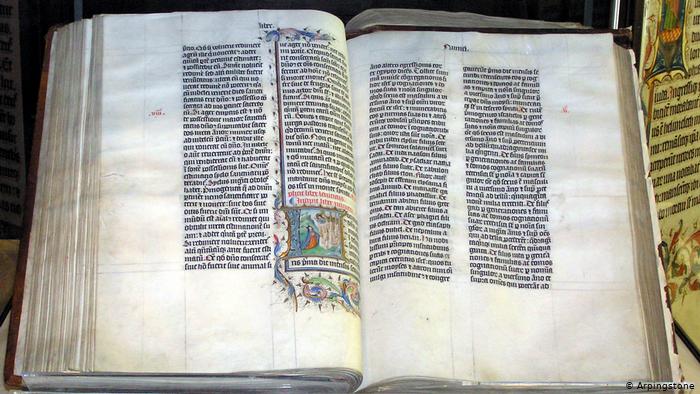This term designates since the Middle Ages the Latin version of the Bible edited by S. Girolamo. In reality, S. Jerome translated from Hebrew only the books of the Old Testament that were included in the canon of the Hebrews and of the New Testament he carried out only the revision of the Gospels. The remaining books of the Old Testament, the apocryphals, (Baruch , Ecclesiastical , Wisdom , Maccabei) and the New Testament (Letters of S. Paolo, proceedings , Catholic Letters , Apocalypse) included in the Vulgate simply report the ancient Latin version, while the Psalter constitutes a revision of it.
S. Girolamo began the work in Rome in 383 at the invitation of Pope Damasus and finished them in Bethlehem around 405-406.
This version, conducted directly on the Hebrew text, it encountered difficulties in establishing itself in the Latin Church and did not establish itself until the eighth century., but from that moment on it had an enormous linguistic and theological influence on the whole Middle Ages.
The Vulgate was the first book printed by Gutenberg in Mainz in 1452-1455.
Luther attacked the Vulgate and proposed his version of the Bible in German (1522-1534), but the Council of Trent, with a decree of the 1546, declared it as the official version of the Catholic Church and asked the Holy See to prepare an edition “highly amended”, work that ended, after many adventures, under Clement VIII, with the so-called Sisto-Clementine Vulgate . The revised text of the Vulgate is the basis of the oldest Catholic versions in the vernacular: English (1609), Italian (Martini, 1776), French (Crampon, 1885).
The progress of biblical studies on a critical and philological basis, accentuated in the secc. XIX e XX, it made people feel the need for an update and a surpassing of the Vulgate . In 1943 Pio XII, with the encyclical Divine Sharpening Spirit , he declared the preference of the Catholic Church for the original texts and the use of vulgar languages in the liturgy, authorized by Paul VI following the Second Vatican Council, it practically took away from the Vulgate the prestige of the official text of the Catholic Church.




How ChristianFaith, why not put an article on the NASB Bible as well (Interfaith Translation in Current Language)?
Vero! As soon as I have time, I'll definitely do it.